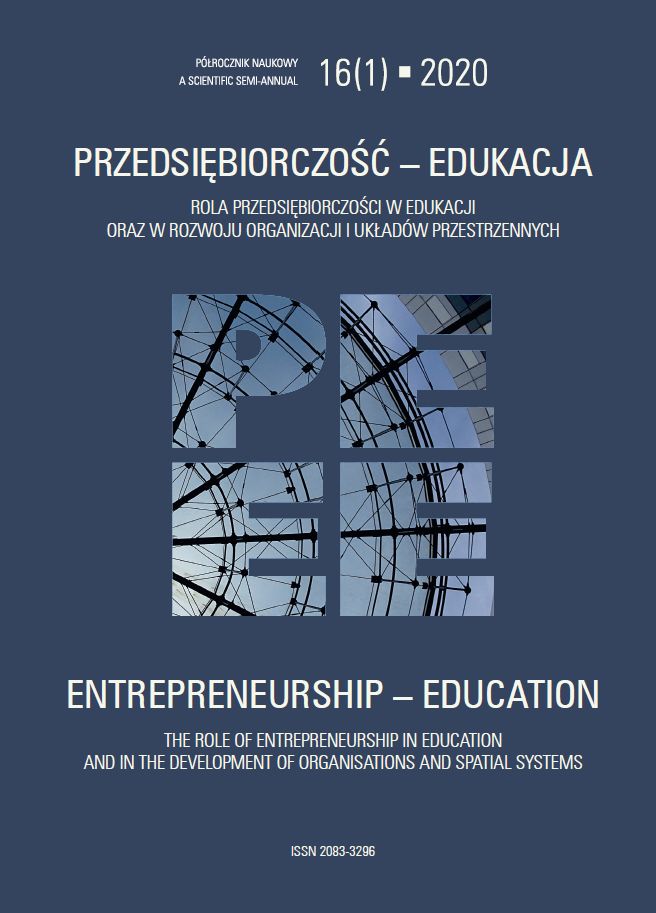The Conditions and Prospects for the Development of Personal Entrepreneurship Education Among the Young
DOI:
https://doi.org/10.24917/20833296.161.1Słowa kluczowe:
activiy, ambition, initiative, personal entrepreneurship, resourcefulnessAbstrakt
The aim of the paper is to define the core, the elements and the meaning of personal entrepreneurship (resourcefulness), describe its level among the young in Poland on the basis of sociological surveys (interviews, questionnaires and group discussions with secondary school students), analyse and assess educational programs for personal entrepreneurship in the light of the expectations of secondary school and university students, as well as design education for personal entrepreneurship. Numerous observations of young people in different life situations show that they are not a symbol of a high of personal entrepreneurship. There are many reasons for this including inadequate teaching programs, overuse of electronic devices and the overprotection of their parents. The latter makes young people unmotivated to achieve anything because they can instantly get all they need. In the paper, it is assumed that a fundamental background of entrepreneurship, including in economic, organisational, societal, political and other spheres, must be personal entrepreneurship (resourcefulness). Because in Polish schools and universities this is not taught, the author has presented a personal entrepreneurship education program.
Bibliografia
Baran, G., Bąk, J. (2016). Przedsiębiorczość jako proces stawania się. W: M. Kosała, M. Urbaniec, A., Żur, (red.), Współczesne dylematy badań nad przedsiębiorczością. Kraków: Wydawnictwo Naukowe UE.
Baron, R.A. (2007). Entrepreneurship: A Process Perspective. W: J.R. Baum, M. Frese, R.A. Baron (red.), Organizational frontiers. The psychology of entrepreneurship. Mahwah, NJ, Us: Lawrence Erlbaum Associates Publisher, 19–39.
Bieniok, H. (2019). Podstawy przedsiębiorczości osobistej (zaradności życiowej). Katowice: Wydawnictwo KOS.
Bieniok, H. (2018). Powszechna edukacja w zakresie przedsiębiorczości osobistej. Horyzonty Wychowania, 17(42), 183–194.
Bieniok, H. (2017). Rola przedsiębiorczości osobistej oraz zarządzania samym sobą w kreowaniu sprawnego przywództwa. W: P. Cabała, M. Tyrańska M. (red.), Zarządzanie organizacjami w społeczeństwie informacyjnym. Innowacje, projekty, procesy. Warszawa: Instytut Organizacji i Zarządzania w Przemyśle „ORGMASZ”, 104–121.
Bieniok, H. (2016a). Zarządzanie biznesem i samym sobą. Warszawa: Difin.
Bieniok, H. (2016b). Istota przedsiębiorczości osobistej w kontekście zarządzania samym sobą. W: M. Kosała, M. Urbaniec, A. Żur (red.), Współczesne dylematy badań nad przedsiębiorczością. Kraków: Uniwersytet Ekonomiczny.
Camus, A. (1957). Upadek. Warszawa: Wydawnictwo Literackie.
Drucker, P.F. (1985). Innovation and Entrepreneurship. Practice and Principles. NY: Harpercollins Publisher.
Kotarbiński, T. (1965). Traktat o dobrej robocie. Wrocław – Warszawa – Kraków: Zakład Narodowy im. Ossolińskich.
Kuratko, D.F., Hodgetts, R.M. (2004). Entrepreneurship: Theory, Process, Practice Mason. Ohio: Thomson South-Western.
Popowska, M. (2018). Przedsiębiorczość społeczna jako klucz do skutecznej edukacji przedsiębiorczej na społecznie odpowiedzialnym uniwersytecie. Horyzonty Wychowania, 17(42), 205–2018.
Wach, K. (2013). Edukacja na rzecz przedsiębiorczości wobec współczesnych wyzwań cywilizacyjno-gospodarczych. Przedsiębiorczość – Edukacja [Entrepreneurship – Education], 9, 246–257.
Pobrania
Opublikowane
Jak cytować
Numer
Dział
Licencja
Artykuły publikowane są zgodnie z warunkami licencji Creative Commons (CC BY-ND 4.0; uznanie autorstwa-bez utworów zależnych).

